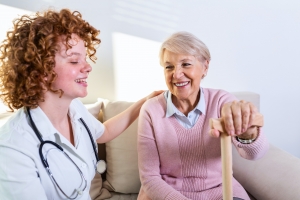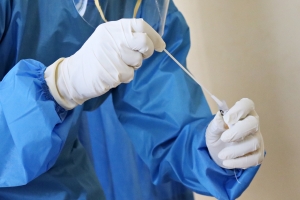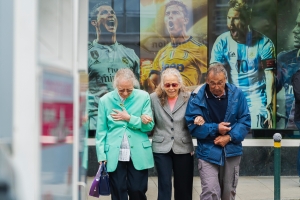Parkrun UK and Alzheimer's Research UK collaborate as runners approach the £2 million mark.
Because one in three people born in the modern era will develop dementia at some point, Alzheimer's Research UK and parkrun UK have decided to extend their partnership into the year 2023. This will allow participants to continue working toward raising two million pounds for dementia research.
One dedicated runner says that running has helped him "cope with the heartbreak" of losing his father to Alzheimer's disease over the last eight years. During this time, the parkrun runners have raised a total of $1.98 million for the charity. This amount was raised by the runners who participated in the parkrun event.
Stuart Lambie, 63, from Shrewsbury, started jogging in his late 50s through his local parkrun before he was motivated to help Alzheimer's Research UK in honour of his dad, Ian, who passed away in 2020 due to Alzheimer's disease.
He stated, "It was parkrun that helped me get into running, and it was parkrun that led me to Alzheimer's Research UK." It was at that time that my father was dealing with Alzheimer's disease, so when a friend pointed out that they are the official charity partner, it seemed like it was the right fit for me as my dad was living with it at that time. Running helped me deal with the grief of losing my dad to Alzheimer's; thus, it's beautiful that I can use running to promote dementia research.
After competing in the 2021 London Marathon and the 2022 Edinburgh Marathon, Mr. Lambie has contributed thousands of pounds to the cause of dementia research. He plans to compete in the 2021 London Marathon once more in April.
"It's lovely to think that I ran my first parkrun all those years ago, and even more remarkable to think that I'm now running marathons and collecting money for a cause that is so near and dear to my heart. "
Mr. Lambie adds, "I am very honoured to be a parkrunner and a supporter of Alzheimer's Research UK, and I am so pleased with what these two incredible organizations are accomplishing together."
It is estimated that throughout a person's lifetime, dementia will affect one out of every three persons born in the modern era.
The message of the charity's Think Brain Health campaign has also gotten significant exposure thanks to the relationship, which has significantly contributed to this effort. As a result, it has helped bring attention to the fact that maintaining a healthy lifestyle and being socially engaged are two crucial factors that can contribute to preserving our marvellous brains and reducing the chance of developing dementia.
The chief executive officer of Alzheimer's Research UK, Hilary Evans, stated: "We cannot express how thankful we are that, over the past eight years, such a large number of parkrunners have supported our initiative. Many of them have family members or friends who have developed dementia, and this is the driving force behind their desire to lend us assistance."
According to Alzheimer's Research UK, if we do not find preventative measures and therapies for dementia, one in every three people born today will get dementia at some point throughout their lifespan.
According to Ms. Evans, "But our incredible backers and smart partners, like parkrun, are helping us fuel world-class studies to create life-changing discoveries for individuals with dementia."
"Advancements that will allow them to remain linked to their families, their worlds, and themselves for a longer period."
We are delighted to announce that our cooperation with parkrun will continue through 2023. We are optimistic about what we will be able to do in the future, both in terms of the further support that parkrunners will provide for research and in terms of the continuous efforts that they will make to bring attention to dementia.
This involves assisting parkrunners so that they may safeguard their brain health by engaging in both physically and socially stimulating activities.
A sad fact is that dementia affects a significant portion of our population.
parkruns are events that occur in communities worldwide every week and are open to the public. The races take place on Saturday mornings and are a distance of five kilometres. They are held in parks and other open areas.
Children ages four to 14 may participate in the two-kilometre junior parkruns every Sunday morning.
The Chief Executive Officer of parkrun UK, Russ Jefferys, stated that they are "very pleased with our long-standing association with Alzheimer's Research UK and are thrilled that we've renewed our contract for the year ahead."
It is sound knowledge that maintaining a healthy lifestyle and engaging in meaningful social activities lowers one's probability of developing dementia in later years. People may discover a place to interact with others and get support leading a more active lifestyle in their local parkrun community. parkrun communities can be found all around the United States. Sadly, dementia touches the lives of many of us, either directly or via the presence of a family member or friend who has dementia. It should not be surprising that the parkrun community has shown an unwavering willingness to embrace the relationship over the past several years.
"I'm confident that support will continue into 2023, and it won't be long until we reach two million pounds raised towards life-changing discoveries," the author says. "It is an excellent feeling to know that we're making a difference in people's lives."
Yomi Eletu, a former IT consultant, says he was inspired to launch his own home care company because "I know what proper care should look like" due to his horrible care as a child and adolescent. After Mr. Eletu struggled to get care when he was young, he made it his life's objective to guarantee that all people had ready access to "high quality" in-home support services. This desire led him to purchase a franchise for Caremark home care in Doncaster.
The treatment that Mr. Eletu and his late sister received while both unwell prompted him to say that the care was "bad and might have been so much better." Mr. Eletu claimed this because he remembered the care he and his sister received when they were both ill.
Mr. Eletu, who was quoted as saying, "Coming from a place near my heart," added, "I'm particularly delighted to be a part of our local Doncaster community, giving compassionate, excellent care at home to some of our most vulnerable citizens."
"Having been in a vulnerable state myself, I am familiar with the characteristics of appropriate care during those times. Consequently, moving into the care sector and creating my new care firm is coming from a place that is very near to my heart.
The businessman decided to purchase the Caremark Doncaster care franchise from the industry-leading home care franchisor Caremark, which has over 120 offices in the United Kingdom and elsewhere in the world. People receive assistance from Caremark so that they may continue to live freely in their own homes or, if they want, with a live-in care assistant.
Staff members in care desired.
"Doncaster is home to a sizeable population of people of retirement age, the majority of whom will require some form of care in the not-too-distant future. I eagerly anticipate the day when I can assist them in leading joyful, independent lives in the comfort of their own homes and provide them with the level of care to which they are entitled."
The home care company Caremark Doncaster hired Shanaye Latouche to fill the care manager role, and Mr. Eletu is hiring new care personnel.
The in-home care company is looking for "caring, dedicated people who desire to join the Caremark team and contribute positively to the lives of the residents of Doncaster."
Mr. Eletu discussed his goals for the company as follows: "At the moment, we are eager to give the greatest levels of care to everyone who needs it. However, if we detect a trend or pattern in a particular region and can satisfy those demands, we will investigate those options."
People with a terminal condition claim that the world may have gone on from Covid-19, but they still can't because they fear dying prematurely from Covid and suffer scorn when they attempt to wear masks. The word might have moved on from Covid-19, but it still can't.
A new video has been made based on research conducted by the end-of-life charity Marie Curie and the University of Warwick, which focuses on the experiences of individuals who are terminally ill and live in the West Midlands.
"Your issue, not mine!" they yelled at the person wearing a mask.
The movie demonstrates how people dealing with a fatal disease struggle to balance the need to make the most of the remaining time in their life, the aspiration to live lives of meaning, and the imperative to avoid contracting the Covid-19 virus.
Wendy, who has stage four lung cancer and states in the video that "COVID has not gone away; it is a terrible position for individuals like me who are clinically fragile," falls into this category.
When you are in a public place, you have anxiety and concern for the individuals around you. I need to go out. You have no choice but to leave. I go in as fast as possible and get out of there as fast as possible.
Pauline, suffering from stage four lung cancer, stated, "I was yelled at a shop for wearing a mask." Pauline is speaking from personal experience.
This man advised the others to remove their disguise because the Covid experiment had concluded. I tried to explain that because I had stage four lung cancer, I still needed to wear a mask, but he told me, "that's your issue, not mine!"
The research was based on evidence from persons living with terminal diseases and the care professionals providing care for them. The data was detailed in four papers that made recommendations for hospices. In response to the research, Marie Curie is encouraging patients with terminal illnesses concerned about Covid-19 to get in touch with their information and support team so they can receive both practical and emotional assistance.
"Troublesome to read."
John MacArtney, an associate professor at the University of Warwick and a sociologist specialising in dying and palliative care, stated, "for many, the Covid-19 epidemic feels like a thing of the past." However, as we approach the end of 2022, Covid-19 still substantially influences the quality of life that individuals with terminal conditions can enjoy. Immunocompromised patients make up a significant portion of the patient population of terminally ill patients; as a result, immunizations and booster shots are frequently less effective for these patients. With the existing Covid-19 public health and protection policies, it is unfortunate that the unique requirements of terminally ill patients and palliative treatments remain neglected.
"The consequences of Covid-19 are far from ended," said Sue Morgan, associate director of Marie Curie Hospice in Solihull. We are continuing to put precautions into place to limit the transmission of the virus, similar to what is being done in other hospital settings. We want our patients to live healthy lives and for their families to make the maximum of the time they have left together, whether that be days, weeks, months, or years. It has been challenging to take in the findings of this study by reading them, and it has been unsettling to listen to some of the experiences that others have related.
"I strongly encourage anyone currently coping with a life-limiting condition and concerned about maintaining a healthy life while using Covid-19 to get in touch with our information and support team. They can provide clients with the practical assistance they need to manage risks, an ear to listen, and the emotional support they require.
Marie Curie is the most prominent charity in the United Kingdom devoted to end-of-life care. The organization offers nursing and hospice care to patients suffering from any terminal disease, a toll-free support line and information on all aspects of death, dying, and grief.
Some senior individuals believe they can handle care concerns independently, while others do not want to admit they are becoming older or being labeled as "weak." This has led to more than a quarter of aged persons keeping a fall they had at home a secret from friends and family.
The provider of the Connected Care Platform, Anthropos, commissioned a study of 2,000 people aged 65 and older. When asked why they kept it a secret, 26% of respondents said they could handle any care issue independently, 16% didn't want to be labeled as "vulnerable," and 18% didn't want to acknowledge they were getting older.
A little less than a third (28%) of adults aged 65 and older have attempted to keep their loved ones in the dark regarding their requirement for some form of care help.
Family members are not told some things to prevent "burdening" them.
Thirty-nine per cent of respondents confessed that to save their loved ones the stress of being burdened by their emotions; they would keep those emotions a secret from those closest to them.
These secrets are not restricted to the occurrence of falls; instead, the other most typical concerns include decreased mobility, changes in toileting habits, forgetfulness, trouble sleeping, and loss of balance.
"Considering there are 11 million people who are 65 and over, the research brings it home just how prevalent these problems are," said Jim Patience, chief executive officer of Anthropos, concentrating on passive fall identification without the need for wearable devices. Anthropos was founded on the idea of detecting falls passively without the use of worn devices. If we generalize these data throughout the UK, it may show that almost 2.6 million individuals fall each year, with 686,000 notifying anybody about it. It fits with the more significant trend that we've uncovered: that so many elderly individuals are disguising concerns about their care. We hope that adults of all ages will examine how these findings may assist calm and sympathetic dialogues with older persons regarding all care problems, from falls to forgetfulness.
More than 22,000 people aged 65 and older are admitted to hospitals annually due to injuries sustained in falls.
Joint discomfort (13% of those who have fallen) and items on the floor (11% of those who have fallen) are the following two most significant factors in accidents after reduced mobility (14% of those who have fallen). Approximately a quarter of those who have fallen say it was because they had less mobility.
According to research released by the government not too long ago, the yearly cost of fragility fractures resulting from falls with "reduced force" is expected to be £4.4 billion. According to the Public Health Outcomes Framework, more than 22,000 emergency hospital admissions each year are the consequence of falls among adults over the age of 65.
A fifth of respondents stated that their relatives and friends were aware of what they were up to, even if they had made efforts to conceal it from them. Eighty-three per cent of this group reported that they had the sensation that a weight had been removed off their shoulders after disclosing their secret to family members.
Some senior individuals believe they can handle care concerns independently, while others do not want to admit they are becoming older or being labeled as "weak." This has led to more than a quarter of aged persons keeping a fall they had at home a secret from friends and family.
The provider of the Connected Care Platform, Anthropos, commissioned a study of 2,000 people aged 65 and older. When asked why they kept it a secret, 26% of respondents said they could handle any care issue independently, 16% didn't want to be labeled as "vulnerable," and 18% didn't want to acknowledge they were getting older.
A little less than a third (28%) of adults aged 65 and older have attempted to keep their loved ones in the dark regarding their requirement for some form of care help.
Family members are not told some things to prevent "burdening" them.
Thirty-nine per cent of respondents confessed that to save their loved ones the stress of being burdened by their emotions; they would keep those emotions a secret from those closest to them.
These secrets are not restricted to the occurrence of falls; instead, the other most typical concerns include decreased mobility, changes in toileting habits, forgetfulness, trouble sleeping, and loss of balance.
"Considering there are 11 million people who are 65 and over, the research brings it home just how prevalent these problems are," said Jim Patience, chief executive officer of Anthropos, concentrating on passive fall identification without the need for wearable devices. Anthropos was founded on the idea of detecting falls passively without the use of worn devices. If we generalize these data throughout the UK, it may show that almost 2.6 million individuals fall each year, with 686,000 notifying anybody about it. It fits with the more significant trend that we've uncovered: that so many elderly individuals are disguising concerns about their care. We hope that adults of all ages will examine how these findings may assist calm and sympathetic dialogues with older persons regarding all care problems, from falls to forgetfulness.
More than 22,000 people aged 65 and older are admitted to hospitals annually due to injuries sustained in falls.
Joint discomfort (13% of those who have fallen) and items on the floor (11% of those who have fallen) are the following two most significant factors in accidents after reduced mobility (14% of those who have fallen). Approximately a quarter of those who have fallen say it was because they had less mobility.
According to research released by the government not too long ago, the yearly cost of fragility fractures resulting from falls with "reduced force" is expected to be £4.4 billion. According to the Public Health Outcomes Framework, more than 22,000 emergency hospital admissions each year are the consequence of falls among adults over the age of 65.
A fifth of respondents stated that their relatives and friends were aware of what they were up to, even if they had made efforts to conceal it from them. Eighty-three per cent of this group reported that they had the sensation that a weight had been removed off their shoulders after disclosing their secret to family members.





